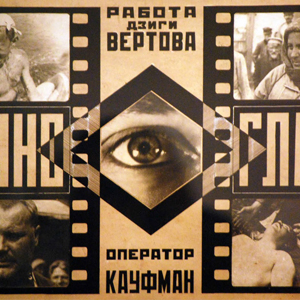
ACFNY SUPPORTED | FILM RETROSPECTIVE | DZIGA VERTOV | Kinonedelja (Kino-Week) nos. 31–35 | Kino-Pravda [excerpts]
Kinonedelja (Kino-Week) nos. 31–35 (1919, Russia)
Directed by Dziga Vertov
Silent. Approx. 62 min.
In this program, dedicated to Kino-Week issues from 1919, we see workers forced by the Russian government to clear the streets and sidewalks of Moscow after a heavy snowfall; the funerals of field commanders; and a demonstration in Kiev protesting the murder of Karl Liebknecht and Rosa Luxemburg in Germany. As Yuri Tsivian writes, “[the protesters seem] ready to invade Germany to help Communists there….In those days, many believed that what was going on in Russia was the beginning of the last war on earth—the World Revolution predicted by Karl Marx.”
Kino-Pravda [excerpts] (1930s, USSR)
Directed by Dziga Vertov
Silent. Approx. 16 min.
These highlights from the first nine issues of Kino-Pravda are a part of film history itself: according to historian Jay Leyda, they were compiled by The Museum of Modern Art’s Film Library in the 1930s, and pieced together with English titles in the manner of Russian Constructivism.
ABOUT THE RETROSPECTIVE
Of all the masters of Soviet cinema—most notably Sergei Eisenstein, Lev Kuleshov, Vsevolod Pudovkin, and Grigori Aleksandrov—Dziga Vertov (né Denis Arkadievitch Kaufman, 1896–1954) is arguably the one whose still-radical experiments in image and sound, and enduring influence among an astonishing range of contemporary filmmakers and artists, from Jean-Luc Godard to Richard Serra to Steve McQueen, have yet to be fully appreciated or celebrated.
In close collaboration with the Austrian Cultural Forum New York and the Austrian Film Museum, MoMA has launched this retrospective, the most comprehensive ever assembled in the United States, and seeks to redress this with an extensive selection of Vertov’s silent films, sound features, and related work by collaborators and rivals in what Vertov called his “factory of facts.”
This screening is one of 11 programs of Vertov’s silent films, drawn primarily from the Austrian Film Museum’s unparalleled collection, including the premieres of fourteen Kino-Week films from 1918–19, and, for the first time together, all of his extant Kino-Pravda films from 1922–25. The retrospective continues with such masterworks as Stride, Soviet! (1926), A Sixth Part of the World (1926), The Eleventh Year (1928), Enthusiasm: Symphony of the Donbass (1930), Three Songs of Lenin (1935/38), and other sound films. Vertov’s exhilarating body of work must be seen not as a succession of individual films, but as one continuously evolving movie; “free of the limits of time and space,” he wrote, it would lead to “a fresh perception of the world” and a revolutionary passage from the Old to the New.
All films directed by Vertov, except where noted, and with simultaneous English translation or electronic subtitles. Screening descriptions adapted from texts by Yuri Tsivian and others, principally from the 23rd Pordenone Silent Film Festival catalogue.
VENUE
The Museum of Modern Art
Theater 2 (The Roy and Niuta Titus Theater 2), T2
11 West 53 Street
New York, NY 10019
www.moma.org
Film admission tickets can be purchased in person only. Museum members may reserve screening tickets online.
Please visit http://www.moma.org/visit/calendar/film_screenings/12162

